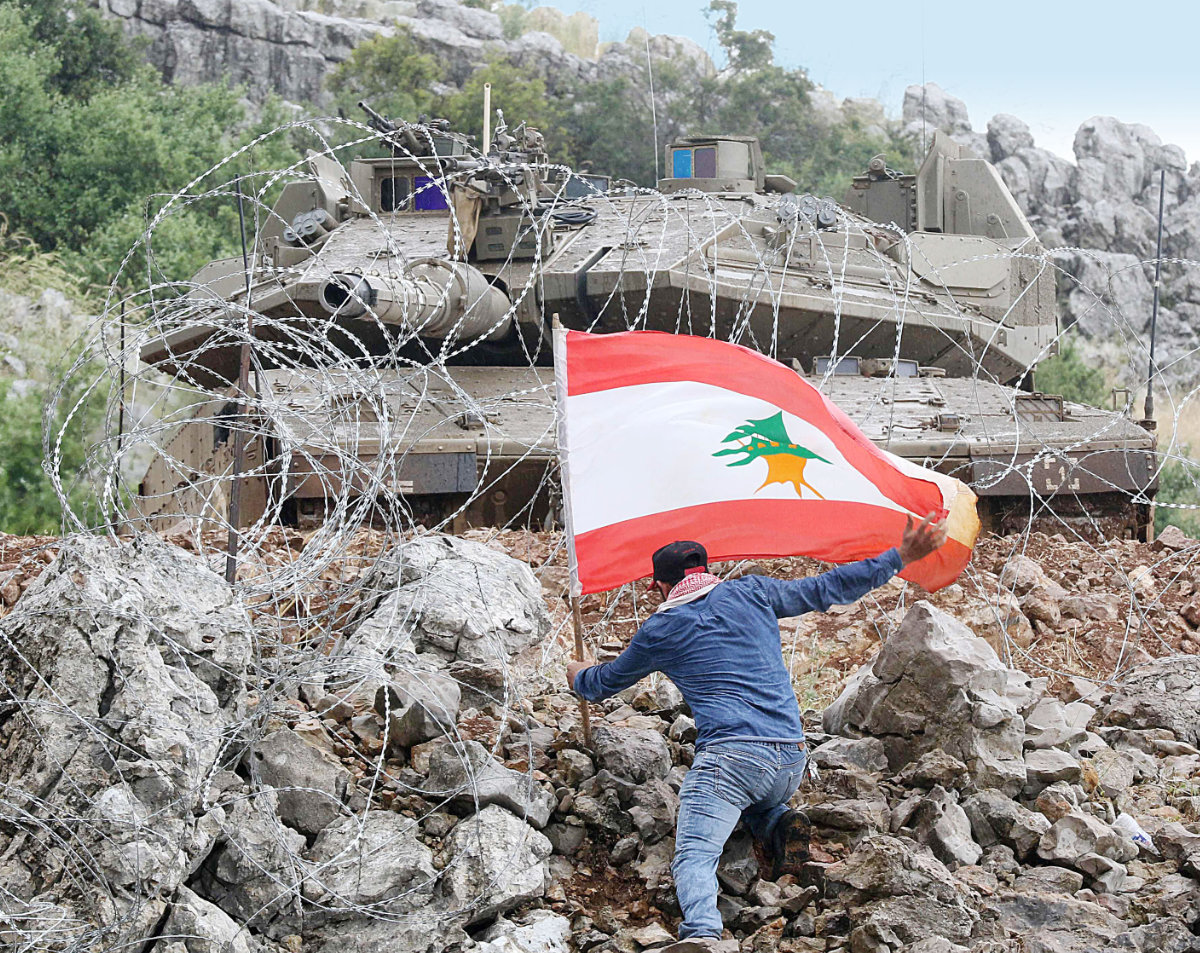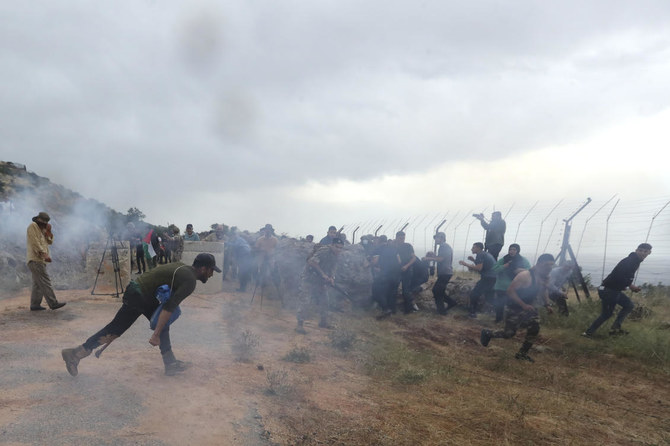BEIRUT: UN peacekeepers in southern Lebanon called for calm on Friday after Lebanese and Israeli troops came close to direct confrontation in the flashpoint “Blue Line” border area.
The Lebanese army was deployed to protect residents of villages around the town of Aarqoub who were protesting against Israeli bulldozers and diggers excavating in the area.
Villagers tried to cross the border line marked by UNIFIL to remove part of a separating fence, and were met by volleys of tear gas from Israeli troops.
Mohammed Mortada, Lebanon’s caretaker culture minister, said: “Are the Israelis so stupid as to think that tear gas canisters will stop land- owners and right holders from responding to their violations?”
The Israeli army said it was responding to “riots” and claimed that two Lebanese soldiers “pointed two RPG weapons toward an Israeli patrol” in the Chebaa Farms area.

A Lebanese protester plants the national flag across the fence near the border village of Kfarchouba during an anti-Israeli demonstration on Friday. (AFP)
Ismail Nasser, a 58-year-old retired soldier from Kfarchouba, defied Israeli tear gas to stand in front of a bulldozer and prevent it from digging further. Nasser said the land being bulldozed by Israel belonged to him and his ancestors.
A video showed Nasser’s actions, with the bulldozer driver trying to move forward and throw dirt at him, before he was pulled away by bystanders.
Nasser said that the land being bulldozed by Israel belonged to him and his ancestors.
A Lebanese security source told Arab News that Israel had been “unusually active” for more than a week in Aarqoub, especially in the hills of Kfarchouba.
“They are trying to change the features of the region by digging trenches and removing rocks in order to extend a new two-kilometer iron fence between Al-Sammaqah and Bawabat Hassan adjacent to the Baathael pond in Kfarchouba,” the source said.
The non-demarcated area belonging to the residents of Kfarchouba is about 8 km.
Residents of Kfarchouba, Chebaa, Kfarhamam and villages around the mostly Sunni town of Aarqoub performed Friday prayers in Kfarchouba to protest against the Israeli operation.
MP Kassem Hachem and Sheikh Hassan Dallah, the mufti of Hasbayya and Marjaayoun, criticized the bulldozing by the “enemy” and called on UNIFIL troops “to put an end to the Israeli violations of Lebanese sovereignty.”
UNIFIL spokesman Andrea Tenenti said: “UNIFIL peacekeepers have been on the ground from the very beginning to ensure that cessation of hostilities is maintained, restore stability and help decrease tension.
“We urge the parties to use our co-ordination mechanisms effectively to prevent misunderstandings, and violations, and contribute to the preservation of stability in the area.
“UNIFIL is actively seeking solutions. We call upon both sides to avoid actions along the Blue Line that may escalate tensions.”
UNIFIL’s yearly mandate is set to be renewed next September. The last renewal included a mandate from the UN Security Council granting greater freedom to operate independently, and without coordinating with the Lebanese army.
Israeli forces occupied the Syrian portion of the Kfarchouba heights and the surrounding agricultural land in 1973 but withdrew after signing the Agreement on Disengagement with Syria in 1974.
Kfarchouba witnessed a fierce battle in 1976 when Palestinian commandos expelled occupying Israeli forces from the town.
Two years later, Israel invaded the Lebanese border area as part of Operation Litani and occupied several regions including Kfarchouba.
In 2000, the Israeli army withdrew from the majority of the Lebanese southern towns and a withdrawal line — known as the Blue Line — was created.
The Kfarchouba hills and the Chebaa farms were not among the freed regions, as the UN considered their status to be part of a future solution for the Israeli-Syrian conflict.
However, the Lebanese government and Hezbollah declared this region occupied Lebanese territory.

















